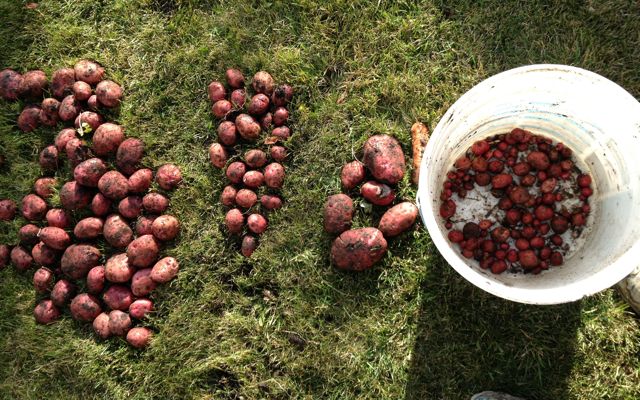 Diet has two distinct meanings today. We tend to think only of “restrictive (in some way) plans for the purpose of weight loss”.
Diet has two distinct meanings today. We tend to think only of “restrictive (in some way) plans for the purpose of weight loss”.
Diet also (perhaps more correctly) means “a way of eating” from the Greek word ,diaita meaning a “way of life”.
There’s a clue. To be successful we need only to seek food that supports our desired way of life.
And there lies the problems with diets, of the former connotation. They don’t work because they are the antithesis of “a way of life”.
Let’s explore: D-I-E-T
D: Deprivation, not generally an ingredient in success!
When I used to decide to “go on a diet” to “lose a few pounds” the first thing that happened was intense cravings for the very foods that I had foresworn. I’d scour the cupboards looking for partial bags of chocolate chips or go spelunking in the freezer for a forgotten bag of Christmas cookies.
Prohibition doesn’t work. Saying you can’t have it is entirely the wrong approach.
I know that bread bloats me, makes me feel like I have a rock in my gut, and makes the scale go up as much as eight pounds. My body is telling me bread is poison.
I no longer “can’t have bread”. I “choose” not to eat bread because I would rather not experience those symptoms. That attitude adjustment has made it easier to avoid bread.
Diets don’t work because they start with deprivation.
I: Impossible: most diets are impossible to sustain, contradicting the age-old wisdom that what we eat is integral to the fabric of our lives, diaita!
Diets fail to help people reconnect to their food. Sustainability becomes impossible.
Many popular diets are effective until the restrictions are lifted and their clients find themselves back on the weight-loss roller coaster.
Diet companies make billions of dollars each year selling their products. They have no motivation to help you understand why you overeat. If you knew the secrets, they would lose your future business.
Shareholders would not be Impressed! If you have troubles sticking to a diet, you’re not alone. They are impossible!
E: Elusive: the goal is elusive because it’s the wrong target.
We are not sick because we’re fat. We’re fat because we’re sick.
Weight loss isn’t the goal. It’s the by-product of improving our health.
We have poisoned and continue to poison ourselves on many fronts. Our food, air, and water assault our systems continuously. Our bodies are ill-equipped for the constant bombardment.
When we diet and lose weight, we often feel lousy or downright sick as the toxins leave their fat-cell barracks. Without understanding the process, dieters give up when they have these symptoms. Knowing why they feel distress can help them persevere to the rewards of good health.
If your weight loss goals are elusive adjust your target. Cultivate an environment of good health and the pounds will fall away.
T: Temporary. Most diets simply can’t last.
Many diets impose limits all but guaranteeing participants will fail. Especially grievous are the meal replacement programs. Dieters struggle to eat in the real world. Instead of blindly replacing meals, “drinking” their calories they would benefit from learning more about making healthy choices.
Ironically, most meal replacements are rife with sugar, an addictive drug for those trying to be healthy and reach a healthy weight.
Sadly, there’s simply too much money at stake for diets to go the way of the dodo. If people knew about diaita , the secret they truly hunger for, the diet industry would suffer greatly.
But then perhaps demand for organic produce would rise and the economy would make up for lost diet revenue. One can dream!
“Eat, drink and be merry for tomorrow we diet!”
Is this your New Year’s vow, year after year?
If D-I-E-T as a “restrictive eating plan for the purpose of losing weight” is in your lexicon, I urge you to rethink your approach. Choose a way of life, a diaita. Your eating will follow and your body will repair itself.
Finally, here are a few Tips for Adopting a Better Diet:
- One thing. Don’t try to change decades of bad habits in one day/week/month. Pick one new thing at a time. It can be “eat more fruit” or “eat more salad” or “replace chips with popcorn”. Everybody can do one thing. Then pick another. In no time your bad habits are changed.
- Choose food that is processed as little as possible. Cooking, freezing, drying are all examples of processing though some are less damaging to food than others.
- Reconnect with your food. Know your farmer. Get your hands dirty and grown your own.
- Read labels and understand that food manufacturers actively seek to fool you into thinking their food is healthier than it is. They use hollow language like “natural”, which means nothing. They use five types of sugar so sugar doesn’t have to be listed as the main ingredient. Buyer beware. Vote with your dollars: refuse to buy products that threaten your health.
- Buy ingredients, not products with ingredients. Do not be fooled by low-fat, low-calorie, low-sugar claims. These words typically describe “foods” with the least nutrient value. Low fat products usually have more sugar; low calorie foods often are filled with inedible ingredients and low sugar means sugar substitutes, which the body thinks of as poison.
Finally don’t despair. Changing a way of life takes practice and involves repeated missteps as you carefully pick the best stepping-stones. You will slip but the definition of success is falling down seven times and getting up eight times. Never say diet!
